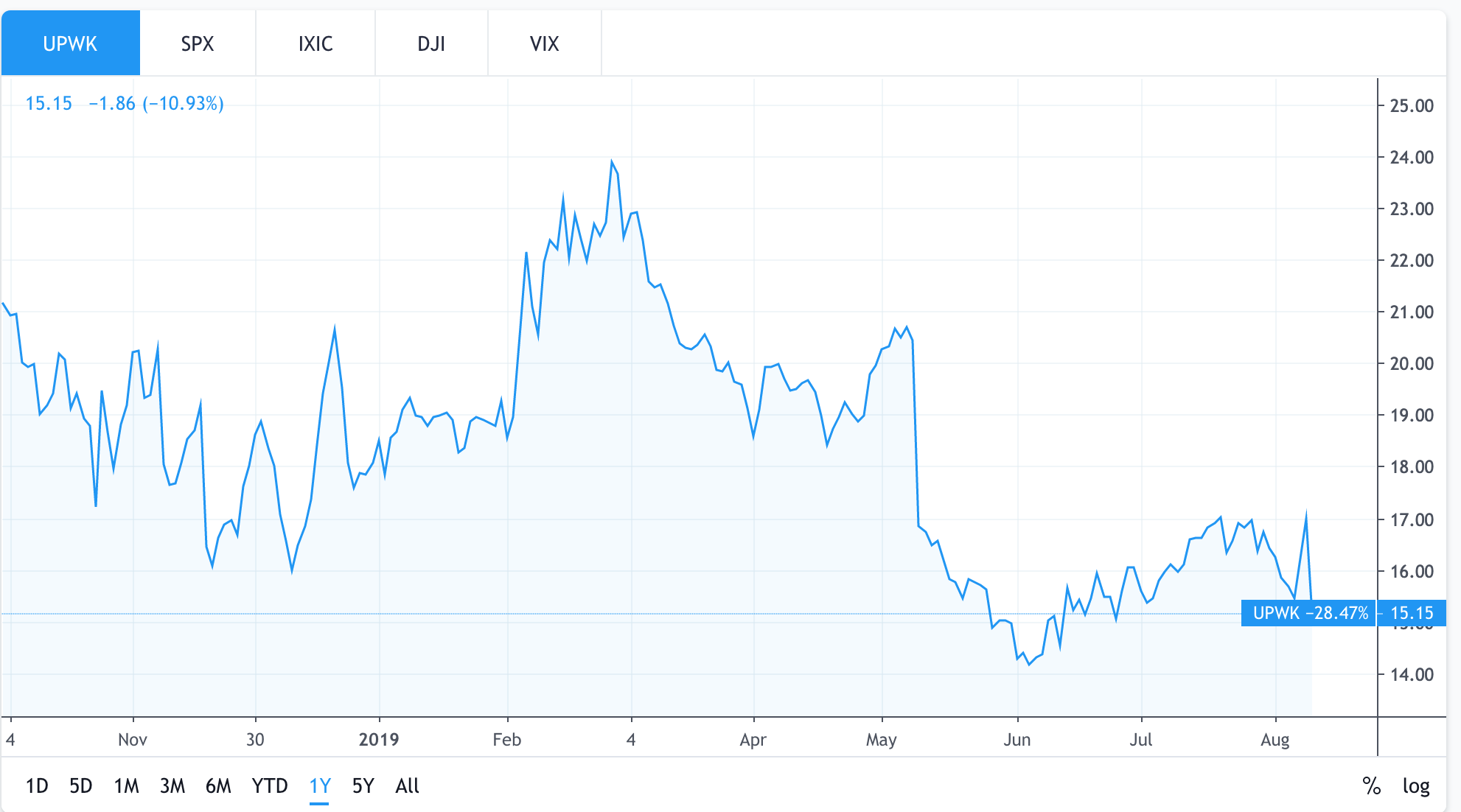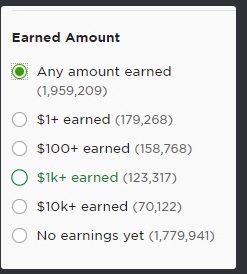
If you’ve already got an Upwork profile, perhaps you’re cheesed off about the fact that as of July 2019, you have to pay to bid on jobs on the most popular platform for freelancers.
Or perhaps you weren’t active on the platform for a month — and discovered your Upwork profile became hidden from potential clients to view. To make it stay public even if you’re inactive, they’d like you to pay $14.99 a month for the Upwork Freelancer Plus level (recently raised from $10/mo.)
It’s not just you. Changes are afoot at Upwork — and freelance writers have mixed feelings about whether they’re good or bad for pro writers. If I don’t miss my guess, more changes will be coming down the pike, too. (Upwork didn’t respond to multiple interview requests.)
For background, you can see 133 pages of users’ reactions to the changes here, my readers’ reactions and experiences with Upwork freelancers on LinkedIn, and a lengthy Reddit discussion of the changes here. Upwork’s announcement of the changes — which rolled out in July — is here.
To find out what it all means for freelance writers, I spoke with many who use Upwork — or who’ve tried to sign up recently.
Yes, you may know that I firmly believe that if you want to be a successful freelance writer, you should find your own clients, rather than trusting your career to the whims of online intermediary platforms and freelance sites with job listings …but I know many writers find these sites useful.
So I’ve got a report for you on what the new changes mean, and many tips on how to succeed in finding jobs on Upwork today.
A brief history of Upwork
To help you understand why the jobs scene is changing for Upwork freelancers, let’s begin with a quick review of its evolution as another one of those freelance sites that attracts writers. The platform was created in 2015, when Elance merged with oDesk.
Upwork went public in fall 2018, raising $187 million in its initial public stock offering. That money went to its founders and early investors. The IPO valued the company at a whopping $1.5 billion (meaning most company shares are still privately held by key players).
Going public also means Upwork’s income and profit figures are now public. How’re they doin’?
Well, in 2018, Upwork made $253 million on gig volume of $1.76 billion — but showed a net loss of $20 million. In the first half of 2019, Upwork reported it took in $143 million, and lost $6.7 million.
Yes, you can take a minute to think about what an awful lot of money is rolling into Upwork’s coffers, from taking a cut of our hard work (and they charge the clients, too. Double dippers!).
And still no profits. It’s a little baffling, right?
But now you can see the problem, and the arrival of new and higher fees for freelancers makes more sense.
Upwork has gotta turn all that red ink into black, pronto, or its share price is gonna dive and it will be headed to the same desolate place as a long list of similar freelance sites. That is, more than it has already:
Stock chart: TradingView
That gives you a visual on the pressure Upwork managers are under to find new ways to make money and compete with similar freelance sites. Higher stock prices mean all those founders and early investors get richer, and lower ones mean their net worth shrinks. So…they’re motivated!
Which brings us to the recent changes. Here’s a rundown on what’s happening, and tips on how to overcome each of the issues:
Change #1: Charges for ‘Connects’
If paying just under a buck for a shot at a good writing job sounds like chump change to you, then paying for Connects won’t be a big deal. But if you’re a low-earning writer bidding on $15 gigs, it could seem burdensome to bid even the $.15 charge for a single ‘Connect,’ which is what the low-paying jobs cost.
Upwork promises that if the client closes their offer and doesn’t choose a writer from the platform, your Connect will be refunded. Writers report that’s a fairly common occurrence too, that jobs are never filled. But it can take quite a while for the system to close it out, and sometimes it doesn’t seem to happen, or can take months to refund back to you, writers report.
Success strategy: Get selective
With Connects costing now, savvy writers are getting choosier about where and how often they submit bids. Romania-based Upwork freelancer Alexandra Bubela, who’s been on the platform since 2012, says at this point, her main targets for bidding are agencies with at least six figures in Upwork jobs under their belt.
Success strategy: Get approached
One way to deal with the new fees for Connects is to stop bidding, and live off inbound invitations. That’s the approach used by 5-year Upwork freelancer and tech-focused writer Alyssa Goulet. The Orlando-based writer reports she’s highly rated on the platform, and gets 2-3 inbound invitations from prospects via Upwork each day.
She says since pay for Connects was instituted, she’s seen the relevancy of those invites improve significantly.
“Now, it may not be an exact fit, but I can at least see why they pegged me for this,” Goulet says. “Upwork is paying more attention to your specialization.”
Her big tip to get approached more: Make sure your Upwork profile is set to be indexable, so it shows up in Google search results.
“Then, people outside Upwork find you,” she says.
Success strategy: Set your rates high
Seven-year Upwork freelancer Angela Brown reports she’s doing well on the platform and attracting quality clients by setting her Upwork profile hourly rate at $90/hr. (up from a big $9/hr. back when she started). She gets just one-quarter of her jobs on Upwork, at this point.
“I got Johnson & Johnson on Upwork,” she notes. “I feel like I’ve figured out how to find good clients on there and stop wasting time. But I’m frustrated with the whole ‘let’s keep taking more of your money’ attitude.”
Success strategy: Target higher-ticket projects
If you’re stressed about the addition of fees for bidding, consider finding ways to cut Upwork’s fees in another area. Brown says she’s only taking Upwork jobs that are for at least $500.
That’s the point at which Upwork’s commission on your income per client sinks from 20% to 10%. Spend $1 or less selectively applying to better-caliber Upwork jobs, and you can save big. If you take a $1,000 job, for instance, you save $100 in commissions, compared with taking several smaller jobs from various clients that are each for under $500. Obviously, that math pencils out.
Is paying for Connects worth it?
The short answer is: It depends. For someone with inbound invites, probably not, says Goulet.
“I don’t think Upwork is as good of a source as they want it to be,” she says. “I don’t think it’s worth paying the fees today.”
Upwork freelancer Jessica Willoby is another writer who simply waits for the invites to roll in, rather than paying for Connects. The Ohio-based writer, who specializes in Amazon product listings, has been on Upwork for 3 years and gets 100% of her clients there, by promoting her specialization. And she’s been steadily raising her rates over the past 18 months, while still attracting invites.
The rule of having to pay for Connects will be good for freelancers, says writer Bubela, because it will cut the number of writers bidding on Upwork jobs.
Brown says the number of tiny-money jobs also seems to be shrinking. “I do feel like it’s cut down on the crap job offers,” she says, “like, ‘Will you copyedit this for $3?’ They’re getting rid of that.”
Has the number of bids shrunk?
One stated reason Upwork instituted pay-for-Connects is that clients griped they were getting overwhelmed with junk applications.
Has pay-to-play changed that? Reports are mixed, but it’s still early days.
“I’m seeing a lot less pitches on job posts,” says Bubela. “Even low-priced ones, like $15 an article. I used to see 50-plus, and now you see maybe 20.”
Goulet isn’t sure if it’s making a difference, though.
“Sometimes I log in and see all these jobs with less than 5 proposals,” she says. “But other times, it looks the same as always [i.e. 50-100+ proposals per job].”
Change #2: Writer-applicants getting rejected
It’s always been true that not all Upwork profile applications are accepted. But in recent months, many writers have vented in online forums that they apply repeatedly but can never get accepted.
“I’m in a Facebook group of writers, and am hearing many writers are not getting approved,” says Bubela.
Another pro writer and Upwork freelancer, Kerry Matthews, reported in on LinkedIn to discuss her difficulty getting accepted — and lack of success getting hired, once she finally got on:
If you’re wondering, rejected writers see a message like this one:
Of course, the problem of getting rejected isn’t new — Tucson-area freelance writer Hannah Vaughan reports getting multiple rejections back in spring 2018 before finally being accepted. Upwork isn’t releasing figures on this, but the number of applications being rejected seems to have grown since Upwork went public, based on the rise in online griping.
If this is you, how can you get in the door? You can read Upwork’s explanations and tips here, and our insiders have three solutions for you:
3 Workarounds to get approved for Upwork jobs
If you get rejected when you apply to join Upwork, you’re free to apply again (and again). Here are several methods that can improve your acceptance odds:
1) Bring a client to Upwork.
This is considered a sure-fire strategy. Find a client, ask them to create an Upwork profile and manage the project there. Then, have them invite you (and only you) to the job.
“It’s boring, and you have to pay the fee, but it works,” Goulet reports. “You’re in, for sure.”
2) Super-specialize.
Insiders say many newbies’ applications are rejected because they’re submitting generic profiles. And that’s no longer what Upwork wants.
Instead, the platform is encouraging writers to create a highly-specialized Upwork profile that spotlight various talents, to make it easier for clients to find what they want. (For existing users, that means creating sub-profiles under their main profile.)
“If you create a super-specialized profile, that’s what’s actually getting accepted,” says Goulet. “You say you’re a white paper writer, for instance, and you actually attach a white paper sample to your portfolio.”
3) Upload your ID.
Much as Twitter has ‘verified’ accounts, Upwork now has an ‘ID Verification‘ badge. If you’re having trouble getting in, prove you’re not a bot or a scammer by uploading a driver’s license, passport, or other ID, and you’ll up your chances of being accepted, says Bubela.
Change #3: Higher fees for Freelancer Pro
This one saw a lot of online griping, but seems to be less of a big deal. It already cost $10 a month for Freelancer Pro, which keeps your profile public during slow periods. Now, it’s $14.99.
The good news? Insiders such as Bubela say paying for pro isn’t really necessary, because it doesn’t make a big difference.
“I never saw a difference,” she says. “Being visible didn’t make any difference. Being top-rated is what matters.”
Upwork Jobs: The new reality
What’s my big-picture takeaway? The recent changes at Upwork may benefit serious freelance writers who already have a track record on the platform.
Especially, it could benefit writers who get picky, set their rates high, and wait for quality clients to find and approach them. Many bottom-rung writers may drop off the platform, unable to afford (or unwilling to risk) paying to bid on small-money job offers. And that may even help rates to rise.
To sum up: The jury’s still out on whether Upwork’s changes will be good for writers (and if so, which ones).
“I’m torn on how I think it’s going to work out,” says Upwork freelancer Brown. “My initial thought is, ‘They’ve made a lot of money off me.’ And they haven’t really thought about the people doing the work.
“It could narrow the field to people who are better qualified. There are still people trying to get writers for lower pay, but I’ve noticed fewer people applying for those jobs.”
Pro: Changes benefit established Upwork writers
Established pros have the spare change to pay for connects. And it’s not a huge deal to pay $180 per year for Freelancer Pro, if you’re earning high five or even six figures. Better yet, high-rated Upwork freelancers have the reputations to attract better clients on the platform, so they stay busy, don’t need to bid, and can avoid these fees altogether.
For better-caliber Upwork clients seeking freelancers, the changes may also be a plus. They’ll wade through fewer bids and more easily connect with highly-qualified writers for the specific industry they’re in, or type of project they need done.
Con: Changes make it tough for new writers to start with Upwork
On the other hand… for hungry brand-newbie writers who’re applying now, but lack a strong niche specialty, and are hoping to land Upwork jobs, the changes are bad news. Upwork has fallen out of love with you.
What writers actually earn on Upwork
How many freelance writers might be in the low-earning category and no longer in favor at Upwork? Turns out, that’s most of them.
Recently, a member ran a search for “article and blog writers and what they earn,” in Upwork’s database. Here’s the chart:
Stunning, isn’t it? Of nearly 2 million writers who’re registered on Upwork for blog and article-writing jobs, nearly 1.8 million report they’ve never made a dime. Vaughan says she’s among those who’ve invested time bidding but never got hired on Upwork.
“I put in a lot of effort, applying to several jobs a day,” she says. “I never even heard back from most of them. And if they gave a rate range, I picked the lower end. Often, if I got a message back, it would say the job had closed, and they didn’t choose anybody.”
Only 70,000 of those 1.95+ million writers have earned more than $10,000 in their entire time on Upwork. That’s just 3.5% of all Upwork’s registered writers in those categories, earning anything that begins to resemble a living.
Other writer types have similar odds of success, I’d wager.
What will you choose? Gamble on spending time applying for Upwork jobs, or find a better way to get clients? Here’s a few things to consider…
- The cost of administrative overhead. It’s entirely possible that Upwork sees a way to cut administrative overhead here, by having millions fewer profiles to manage. They’re encouraging low earners to either pay up, go dark, or get out. And they’re making it harder for inexperienced newbies to join.
- Pay to play, then pray. If you’re a newbie who wants to sign up for Upwork, find a specialty and make it super-clear when you apply. Then, pray.
- Find your own clients & give Upwork a cut. It’s either that or go find a client on your own, and ask them to manage you on Upwork. Sure, you’ll take the income hit paying Upwork’s commission (5%, 10%, or 20%, depending on how much work the client gives you), but this strategy is the only sure-fire ticket in the door.
- Use other freelance sites. You can apply to platforms elsewhere, but expect that you may quickly find a similar reception. Even bottom-of-the-barrel job platform Fiverr bought ClearVoice back in March 2019, and has instituted a Fiverr Pro level as well, signaling it aspires to go up-market, too. But in reality, most freelance sites like Upwork and Fiverr are overloaded with writers and wannabe writers, which typically has a negative impact on rates and increases competition for available jobs.
Upwork jobs or find your own clients?
You may note that the successful Upwork freelancers interviewed for this story all reported clients from the platform make up a small percentage of their total income.
The only way to make sure your writing career grows is to make sure you don’t rely too much on any one of these platforms or freelance sites.
Yes, you could get lucky under Upwork’s new regime. But you could also easily find yourself among the 96.5% of their writers who never land a client. Odds favor it.
Try to game Upwork’s new system, if you’re interested in making that happen. But the most reliable way to build a lucrative, sustainable writing business is still proactively identifying your own prospects, pitching them, getting hired, and keeping 100% of your pay.
Are you on Upwork, or have you applied recently? Add your take on Upwork’s changes in the comments.














